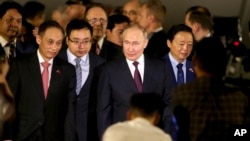The United States called on Vietnam Thursday to support Ukraine’s sovereignty and territorial integrity following Vladimir Putin's one-day visit to Hanoi, part of the Russian president’s brief Asian tour seeking to shore up alliances in the face of mounting Western sanctions.
“We expect that any country, when it engages in conversations with the government of Russia, and especially when it hosts leaders from the government of Russia, will make clear their respect for the principles of the U.N. Charter, including sovereignty and territorial integrity, and convey that those principles must be upheld across the world,” State Department spokesperson Matthew Miller told VOA during a briefing on Thursday.
US diplomat to Hanoi
Meanwhile, the State Department’s top diplomat for Asia is traveling to Hanoi to reaffirm ties after the U.S. and Vietnam upgraded their bilateral relationship last year.
Daniel J. Kritenbrink, assistant secretary of state for East Asian and Pacific affairs, will travel to Hanoi, Vietnam, June 21 to 22, according to a State Department press release.
Kritenbrink will meet with senior Vietnam government officials “to underscore the strong U.S. commitment to implementing the U.S.-Vietnam Comprehensive Strategic Partnership and to working with Vietnam in support of a free and open Indo-Pacific region,” said the release.
Kritenbrink’s trip was planned “well before” Putin’s visit to Hanoi, said Miller.
Vietnam maintains three tiers of diplomatic relationship with other countries: Comprehensive Partnerships; Strategic Partnerships; and Comprehensive Strategic Partnerships. The United States, China and Russia are among the countries that maintain top-tier ties with Vietnam.
U.S. officials did not have an assessment, when asked by reporters, if there is any indication that Vietnamese companies or people are providing material support to Moscow for its war on Ukraine, or whether Washington has warned Hanoi against it.
At the White House, John Kirby, the National Security Council communications adviser, told reporters that the U.S. will “stay focused on continuing to deepen” the Comprehensive Strategic Partnership with Vietnam and “broaden it, improve it, for our own mutual benefit to each other and to the region.”
Putin’s visit to North Korea
Russia and Vietnam pledged Thursday to deepen ties during a state visit by Putin aimed at bolstering his alliances to counter Western efforts to isolate Moscow over the war in Ukraine.
Russia and Vietnam “want to push up cooperation in defense and security, how to deal with nontraditional security challenges on the basis of international law, for peace and security in the region and the world," Vietnamese President To Lam told reporters after talks with Putin.
Putin traveled to Vietnam, a close ally of Moscow since the Cold War, after talks in Pyongyang with North Korean leader Kim Jong Un. Those two countries signed a mutual defense pact.
“It's a significant visit,” said William Courtney, an adjunct senior fellow at the Rand Research organization about Putin’s trip to Vietnam amid Russia’s war on Ukraine and Russia’s growing isolation over that war.
“There's no question Vietnam does depend on Russia for oil, for military equipment and some technology,” Courtney said. “But Vietnam appears to be now trying to broaden its aperture to look in other directions for military equipment as well. One reason might be that Vietnam has seen that a lot of Russian military equipment has performed poorly in Ukraine.”
In Washington, Republican Representative Mike Turner, who is the chairperson of the U.S. House of Representatives Permanent Select Committee on Intelligence, voiced concerns over the possibility of Russia providing North Korea with technological assistance to improve its long-range ballistic missiles and their ability to directly target the United States.
“I think we've all sort of felt intuitively that China, Russia, North Korea, Iran are working together in both their development of capabilities and in their threats to the United States. These symbolic meetings, I think, should allow us to focus on this as a threat that has already been occurring,” Turner said during an event at the Washington-based Center for Strategic and International Studies.
VOA’s White House Correspondent Anita Powell, National Security Correspondent Jeff Seldin and Kim Lewis contributed to this report. Some material in this report came from Reuters and Agence France-Presse.






